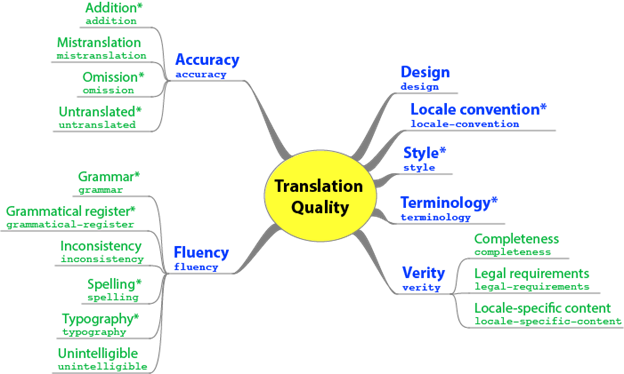What is MQM?
The MQM is a translation quality assessment metrics developed in 2014 by the Quality Translation Launch Pad team (QTLP 2013). MQM is strongly supported by the European Union and can be considered a standard measure of translation quality. MQM currently has a total of 19 revisions with multiple modifications; the current stable version is 1.0. MQM inherits the merits of previous translation quality assessment models and tools, most prominent of which is the famous LISA QA model (developed by Localization Industry Standards Association Quality Assessment, now dissolved).
What is MQM and how is it implemented?
Quality assessment, quality assurance and quality control are paramount processes in any industry, and MQM set its focus on quality evaluation. MQM provides a framework for describing and defining quality metrics used in quality evaluation of translated texts and identifying specific problems in those texts. MQM also provides a systematic framework for describing quality metrics based on the recognition of characteristics of given texts. This set of metrics is designed to suit professional production environment (the translation industry, where translations are created like products, for the purpose of generating revenue) as well as the evaluation and testing environment.
As its name implies, MQM includes dimensions for evaluating translation quality, which are:
- Accuracy
- Fluency
- Terminology
- Locale Convention
- Style
- Verity, and
- Internationalization.
Users can choose the respective aspects based on the characteristics, nature and requirements of each project. After choosing the evaluation aspects, users may select the issue types – MQM has a catalog of over 100 issue types with full definitions and examples. This is a relatively large number, but MQM also has a smaller issue category, called Core MQM, which lists the 20 most common issue, suitable for most purposes.

MQM can be utilized in multiple ways, for example:
- To manually set quality metrics for an LSP, based on evaluation dimensions. Then, proceed with following steps:
- Determine the standards
- Select evaluation aspects
- Select evaluation methods
- Select issues
- Select the weight for issues
- Determine threshold
- Execution
- Use preset quality parameter, which is useful when comparing similar projects
- Highlight errors in text or use a score card
Applying MQM in Language Service Providers (LSP)
Since MQM is highly standardized, the application of this set of metrics at LSPs will significantly contribute to minimizing the impact of subjective assessment on the quality assessment of translation products. tsd Technik-Sprachendienst GmbH, the leading LSP in Germany, one of the pioneers in the application of MQM, proposes a proofreading procedure based on the DQF-MQM framework (which is an extended set of metrics from MQM, combined with DQF, Dynamic Quality Framework) are as follows:
- Project manager analyzes documents using a translation management system and sends quotes to clients, along with estimated processing time.
- After the request is confirmed, the project manager discusses all the specific requirements with the client, and the project is assigned to the reviewer, performing a review in accordance with the DQF-MQM framework.
- The review is recorded in a separate document, provided to the client for all translations, or placed on a summary sheet.
- Receive client’s feedback.